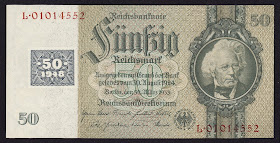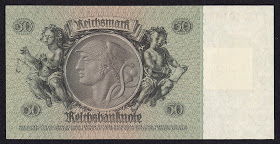Germany Banknotes 50 Reichsmark banknote 1933 David Hansemann 1948 DDR stamp
Reichsbank - Central Bank of Germany from 1876 until 1945
Obverse: Portrait of politician and banker David Hansemann.
Reverse: Cameo bust of the Messenger God Mercury flanked by Cherubs with scale and book (Law and Literature).
Watermark: portrait of David Justus Ludwig Hansemann.
Size : 170 x 85 mm.
German Banknotes
Deutsche Mark (Ost) System - 1948 Currency Reform Issue
Old Rentenmark and Reichsmark notes then in circulation in the Soviet occupation zone had adhesive stamps affixed in June 1948 to extend their validity while new banknotes were being printed. These notes were issued in denominations of 1, 2, 5, 10, 20, 50 and 100 Deutsche Mark. Colloquially, these reissued banknotes were referred to as Klebemark ("sticker marks") or Kuponmark ("coupon marks").David Hansemann
David Justus Ludwig Hansemann (12 July 1790 – 4 August 1864) was a Prussian politician and banker, serving as the Prussian Minister of Finance in 1848.
Hansemann was born in Finkenwerder, Hamburg, the son of a Protestant minister. After studying commerce, he was a representative for a Monschau cloth manufacturer. From 1817, he created different enterprises in Aachen, under which the predecessor company the Aachen native of Munich, which is today part of the AMB Generali. Into the 1820s and 1830s, he came by a large sum of money. His concern for the well-being of his employees and his readiness for generous donations were considered unusual. In 1821 he married Fanny Fremery, who came from a French Huguenot family.
David Hansemann engaged himself for the building of railways in the Rhine Province. He wrote several memoranda about railway. The moreover one he was shareholder of the Rhenish Railway Company (German: Rheinische Eisenbahn-Gesellschaft, RhE). In accordance with a royal cabinet order of February 1837, he became Vice-President of the RhE. He was considerably involved in the establishment of further railway companies, including the Cologne-Minden Railway Company and the Bergisch-Märkische Railway Company.
During the 1830s, Hansemann became increasingly involved in politics, and in 1843, he became a member of the provincial parliament (Provinziallandtag) for Rhenish Prussia. In the year 1847, he became a member of the Prussian United Parliament (Vereinigter Landtag). Hansemann was considered as one of the prominent heads of German Liberalism. Within liberalism, he, along with the later president of the Frankfurt Parliament, Heinrich von Gagern, belonged to the so-called "half ones", i.e. ready to compromise.
During the short-lived Prussian March Ministry under Gottfried Ludolf Camphausen, Hansemann was made Minister of Finance. He retained this post in the next administration led by Rudolf von Auerswald, until his resignation on 8 September 1848.
For the noble elite of Prussia, Hansemann was considered far too liberal; his subtly critical book Prussia and France of 1833 and different memoranda from the 1840s lead him to be thought of as a dangerous radical. On the other hand, he was considered by radicals to be a reactionary serving the elite: Karl Marx scornfully called him a "liberal lick-spittle."
This double resistance, a principal reason for the defeat of the liberalism after the March revolution in Germany, finally led to Hansemann leaving politics. After leaving political life, Hansemann returned to commerce, and in 1851 he formed the Disconto-Gesellschaft, which merged with Deutsche Bank in 1929.
Hansemann died in Schlangenbad, during a cure stay in the Taunus. He is buried in the Hansemann mausoleum at the Matthaeus Kirchhof in the Schöneberg district of Berlin. His son Adolph von Hansemann became one of the richest and most important entrepreneurs of the German Reich, although in contrast to his father, he was not a liberal.

